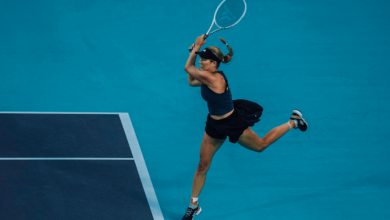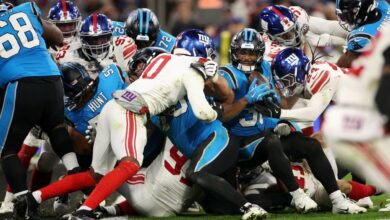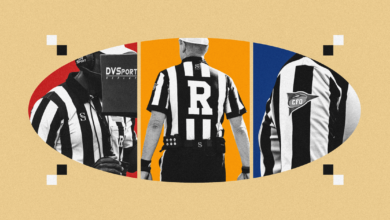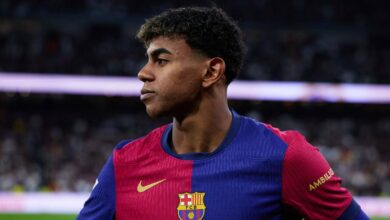The eye-popping $77 billion haul that shook up the NBA landscape — and the future of media
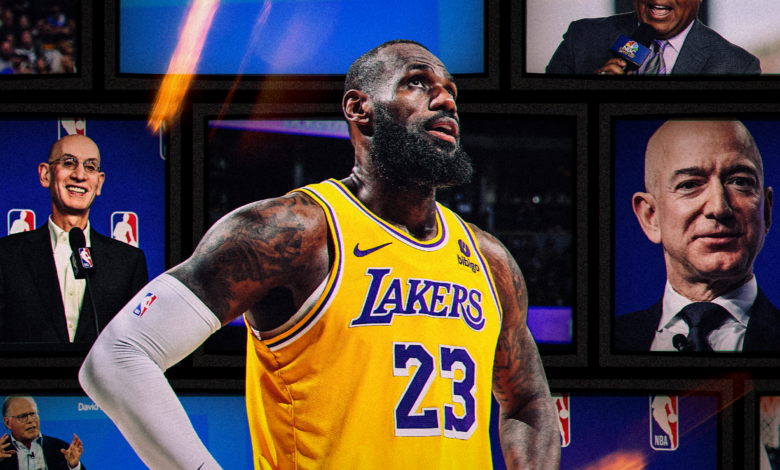
Well past midnight in Paris with final preparations for the Olympics finishing up, NBC Sports president Rick Cordella was tired and in need of sleep.
On this late July evening, the official word if the NBA had returned to the NBC after nearly a quarter century was being confirmed in New York, a time zone six hours earlier.
In his room at the Sofitel Paris Baltimore Hotel, Cordella worked until 1:30 a.m. before finally going to bed. He set his iPhone alarm to go off every half hour as he anxiously awaited the official news from the NBA.
Cordella maybe didn’t need the alarm as his eager bosses and negotiating team were buzzing in with texts, asking if he had heard anything.
At 3 a.m. Paris time, Cordella’s alarm woke him and he checked his phone. He received the text from the NBA’s lead negotiator, Bill Koenig, informing him that TNT was making a play with its matching rights for Amazon Prime Video’s streaming package, not NBC’s. Cordella pumped his fist, called his bosses and some members of the deal team. Finally, he could go back to bed and sleep easy.
The network was back in the NBA business.
Just as ESPN had swiped the NBA from NBC in 2002, NBC had done the same to TNT, buoyed by a surprise distribution plan and an eye-popping financial offer made in the league’s 5th Avenue offices nearly four months earlier.
Being partners with the NBA is so vital in the future of media that the loser in the proceedings, the parent company of TNT Sports, Warner Bros. Discovery, is suing its still current partner, the NBA, in a Hail Mary attempt to stay involved. TNT, home to the wildly popular “Inside the NBA,” believes its matching rights from its current contract with the league should be enforced.
The implications of what has transpired over the last four months of haggling are magnified by the murky shape of media with cable in decline, streaming emerging, free broadcast networks, like NBC, born again as the top sports destinations, and uncertainty constant.
While there is an intense focus on the digital giants taking over, there are few big toys — save for UFC — available anytime soon.
With the NFL locked up into next decade, this NBA deal would be basically the final one before “The Great Rebundling” over the next decade in which consolidation, mergers and acquisitions will very well decide the future of how fans access games well into the end of the century.
“If you look at what else is available, there is not much coming,” Cordella said over the phone from Paris’ Mussée de l’Homme, where the “Today Show” set is located during the Olympics. “This was clearly a big one.”
The three agreements the NBA officially struck with ESPN, Amazon and NBC will result in the league receiving an extraordinary $77 billion over 11 years, beginning in 2025-26.
It is the exclamation point on ESPN chairman Jimmy Pitaro’s six-plus-year run, where he has outlayed nearly $80 billion to create a sports rights moat as his network enters its full direct to consumer streaming era.
It establishes Amazon Prime Video as the clear biggest player in the future of sports viewing with the full-year of programming and realistic designs to one day have a Super Bowl and/or NBA Finals.
And, nearly a quarter century after Bob Costas, Marv Albert and John Tesh’s “Roundball Rock” said goodbye to the league, NBC/Peacock will go into this next stage with the triple threat of the NFL, the Olympics and now the NBA leading as it further tries to establish its streamer and broadcast network as year-round must watches.
The deals also will improve the WNBA’s standing as its Finals will be spread between the three companies with ESPN maintaining five, while NBC and Amazon received three each. The WNBA also will have the ability to forge other agreements and eventually reopen talks with its three big partners if Caitlin Clark, Angel Reese and company continue to see their ratings skyrocket.
Toward the end of April, after TNT failed to reach an agreement with the NBA during an exclusive negotiating window, Comcast chairperson Brian Roberts was quickly on the phone with NBA commissioner Adam Silver, expressing NBC’s interest in the rights to the leagues’ games.
Shortly after, Comcast president Michael Cavanaugh, NBC Universal chairman Mark Lazarus and Cordella made the one-minute walk from their Rockefeller Center offices to the NBA’s on 5th Avenue.
At this point, the NBA already had a framework agreement with one incumbent, Disney’s ABC-ESPN to retain the Finals, while a newly formed streaming rights deal was being locked up by Amazon Prime Video.
While NBA executives, led by Silver and its president of global content and media distribution, Koenig game-planned for years of what could happen during negotiations, NBC surprised the league, according to executives briefed on the discussions.
Sitting across from the NBC team in the NBA’s offices, Silver, Koenig and their lieutenants listened to NBC’s pitch as talks took off.
Not only did NBC topple TNT’s best offer of slightly more than $2 billion, but also NBC put on the table more than it pays the NFL. The $27 billion deal over 11 years ($2.45B a season) is larger than the $22 billion the NFL receives for the same length of time.
In addition, NBC made available to the NBA two prime-time windows. The NBA executive team, according to those briefed on their thinking, thought NBC would want to add “Sunday Night Basketball” after its No. 1 rated in prime time, “Sunday Night Football,” but the NBA was pleasantly surprised that Comcast also had a special, national/regional hybrid plan for the NBA on NBC on Tuesdays throughout the season.
Besides the marquee events, such as six conference finals, the All-Star game and “Sunday Night Basketball”, NBC will have Tuesday night national games where the East and West coast will receive different games that begin in prime time locally.
On a given Tuesday, NBC could have a Knicks–Celtics game at 8 p.m. in New York, while the Lakers face the Nuggets at 8 p.m. Los Angeles time. All the matchups will be available via Peacock, which also will have exclusive games on Mondays.
Comcast’s idea is to combine the NFL, the NBA/WNBA, the Olympics, Premier League and the Big Ten on Peacock to prevent churn, creating a must-have product for the whole year.
“Our portfolio of sports on Peacock is incredibly robust,” Cordella, who played college hoops at Providence under Pete Gillen, said. “You add the NBA to it. I’m a sports fan. You are a sports fan. It feels like a must-have. If you are a sports fan worth your salt, you need Peacock. You need NBC.”
The network believes Peacock will add subscribers and they will stay. It thinks the streamer and the broadcast network will do well in the advertising market. It also hurt a rival, and the cable wing of Comcast could claw back affiliate fees from TNT.
The fear of TV executives for years was that the behemoth digital players — Amazon, Apple, Netflix, Google/YouTube — would just start buying all the rights. But with this NBA round completed, it is clear that Amazon Prime Video is the one that will be a huge part of sports fans’ lives now and for the foreseeable future.
The others have dipped their toes in without fully committing and now will be largely shut out, save for a Christmas Day doubleheader (Netflix) and a Sunday Ticket sale (Google) and smaller leagues (Apple/MLS).
With Amazon’s 11-year, near $20 billion deal for the NBA and WNBA, it now has major sports programming throughout the year. The NBA/WNBA joins “Thursday Night Football” and NASCAR as part of Amazon’s Prime “Free Shipping” $139 per year subscription.
“The model is working,” Jay Marine, Amazon Prime Video’s global head of sports, told The Athletic.
When Amazon was invited to join ESPN and TNT Sports in the exclusive negotiating window early, prior to the late April deadline, Marine and his team showed up with plans as quickly as one of Amazon’s ubiquitous boxes appear on doorsteps. They expediently sealed a deal, including the worldwide rights to “League Pass,” in which fans can directly buy their favorite team’s games. They also will be the home of the WNBA Finals three times over the 11 years.

Foes in last season’s WNBA Finals, Jonquel Jones and Kelsey Plum will see Amazon handle three of the league’s championship series as part of its new contract. (Ethan Miller / Getty Images)
Only two years into Amazon’s NFL deal, the streamer already was a proven performer to NBA executives. When strong “Thursday Night Football” ratings would arrive, Koenig would text Marine congratulating him. The NBA and Amazon leaders further forged a relationship due to the streamer’s WNBA coverage and its deal to show the NBA in Brazil.
The global reach of Amazon also made the company an ideal partner for the NBA, which has focused on the international scene since late commissioner David Stern led the operation.
Marine loved the fit with the NBA, but also was very cognizant that, besides UFC, this was the last big deal and that the NBA would likely seek a very long-term contract.
“One of the things we talked about on this NBA deal is that, while it is an 11-year deal, we think about it more like a 30-year deal,” Marine said. “We want a three-decade, four-decade-plus relationship with the NBA. And we view this deal as kind of just the first chapter.”
Amazon already has convinced the NBA it is worthy of hosting conference finals six times and has grand designs for the future.
“I was asked the other day, ‘Would you ever want to broadcast the Super Bowl?’’ Marine said. “And I’ve never answered yes so quickly in my life. And do I see that being a reality at some point.”
How about an NBA Finals?
“Absolutely,” Marine responded.
During Pitaro’s six-plus years leading ESPN, he has gotten what he has wanted in the sports rights game. Pitaro, a diehard Yankee fan, has been on a shopping spree akin to George Steinbrenner in his heyday. The multi-path plan has been designed to beat away potential newcomers, protect its declining, but lucrative cable business and forge ahead with the dawn of ESPN’s streaming era.
Pitaro has built a sports rights moat by doling out nearly $80 billion – that’s a b for billions – in new deals with the NFL, college football playoff, MLB, SEC, NCAA, NHL, PGA, Wimbledon, La Liga and now the NBA.
One rival executive called ESPN’s suite of rights, “the greatest in the history of sports television.”
It continues to not be cheap. The just-signed NBA contract is for that quaint sum of 11 years and $28.8 billion. ESPN’s current NFL contract, which includes two Super Bowls and 25 games a year, mostly on Monday Nights, is for 10 years and $27 billion.
ABC/ESPN retained the Finals every year, while keeping a conference final for each season except for one. It also believes it added value for its soon-to-arrive full ESPN direct-to-consumer product with a Red Zone type show on its game nights and, internationally, where it can stream its games on Disney+. It will remain the top home for the WNBA with five of its Finals over the 11 years.
While ESPN will attempt to retain the UFC and is expected to use or threaten to trigger an opt-out in its MLB contract that is due after next season, it is largely done for the moment, according to executives briefed on its plans.
The NFL’s opt-out on ESPN’s deal is after the 2030-31 season, while the network’s and Amazon’s are up following the 2029-30 year. So ESPN has a slightly longer runway with the most important league rights, allowing it to move into streaming with the NFL and NBA leading the way.
The network has also discussed equity deals with both leagues that would see either or both have a stake in ESPN. Those talks could heat up again relatively soon.
While ESPN is looking to the future with streaming, it wants to maintain its linear carriage agreements, which are for $10-plus a month, still a great business even if the current 66.5 million homes are way fewer than the 100 million from 2011.
ESPN has upcoming negotiations with Comcast, YouTube TV, DirecTV and Verizon Fios over the next two years, and it always planned to have top NBA games, along with the NFL and college football, to stack its deck.
While the digital players outside of Amazon mostly sit on the sidelines, ESPN is about to make a big pitch to be the solution for sports fans without cable.
In the fall, the start of “The Great Rebundling” in partnership with Fox Sports and TNT Sports, ESPN will debut Venu Sports, a direct-to-consumer subscription service that will cost $42.99 per month.
In 2025, it will bring ESPN, the mothership, to consumers directly with its own offering that is expected to be priced in the $25-$30 range per month. Pitaro has structured all the new rights deals so ESPN’s entire programming lineup can be available to customers without a cable subscription.
Fans also can access ESPN through places such as YouTube TV, which can be had for $70-$75 and offers a larger collection of channels than Venu will. The billion dollar moat has been built so ESPN can meet customers at different price points to access its games.
TNT knows this is very well its final season with the NBA. Over its 35 years, it has built arguably the greatest sports studio show of all-time, centered around Charles Barkley. It is proceeding with the litigation in which it claims it has the right to match Amazon Prime Video’s package and continue with the NBA. It knows potentially losing the NBA is a huge blow to its portfolio.
While it is blaming the NBA and seems desperate to keep it, two years ago, Warner Bros. Discovery’s CEO David Zaslav told an investors conference, “We don’t have to have the NBA.” The network didn’t get a deal done during the exclusive negotiating window, allowing NBC to blindside it by making a financial and reach offer that exceeded what TNT had put forth.
TNT’s view of the NBA negotiations basically comes down to it believes it was Charlie Brown and the NBA was Lucy, moving the football at the last moment whenever a deal was close. The NBA looks at it differently and was prepared to never give NBC the opportunity if the TNT numbers were right. A judge will have a say about how it all works or maybe the parties will settle for some sort of rights and/or financial package.
But TNT is not putting “Going Out of Business” signs on its Atlanta studios. Barkely told The Athletic that his contract is for 10 years and $210 million. TNT, with or without the NBA, is determined to figure out a way to utilize him and not let him go elsewhere.

The “Inside the NBA” crew could be on its final season with TNT. (Brandon Todd / NBAE via Getty Images)
It has made moves over the last 10 months to try to fortify its lineup. It spent in excess of $25 million per game for a couple of first round College Football Playoff games in a sublicense agreement with ESPN. It added the French Open at $65 million a tournament. Big East men’s and women’s hoops and Mountain West football are going to be on TNT. They are singles and doubles compared to the home run of the NBA.
TNT already has deals for MLB and the NHL, including significant playoff action. United States men’s and women’s soccer, as well as NASCAR, are on its air. TNT Sports are aligned with ESPN and Fox with the Venu Sports direct-to-consumer streaming service. The company is trying to turn TruTV into something equivalent to ESPN2.
Though Warner Bros. Discovery is in debt, it seemingly has billions in its vault that was headed to the NBA’s Fifth Avenue offices. It will need to be creative to grow, perhaps leaning on more sub-licensing to fill out its programming roster.
As far as the NBA, TNT left the door ajar, allowing NBC and Amazon to walk in and partner with the league, in the potential last market-moving deal of the sports media decade.
Amazon and NBC joined ESPN, forming the NBA’s new Big Three, believing the league was a must-have, an unusually available powerful commodity. Cordella was willing to wake up through the night to confirm it was official. Marine wants Amazon in business with the NBA for decades. Pitaro never looked back in keeping the “A” package.
It will be three presidential elections before the NBA rights are conceivably available again. The corporate winners and losers during the forthcoming media reckoning very well may be decided by then.
(Photo illustration: Dan Goldfarb / The Athletic; photos: Getty; David Dow / NBAE, Slaven Vlasic, Garrett Ellwood / NBAE, Chris Graythen, Alex Wong)

